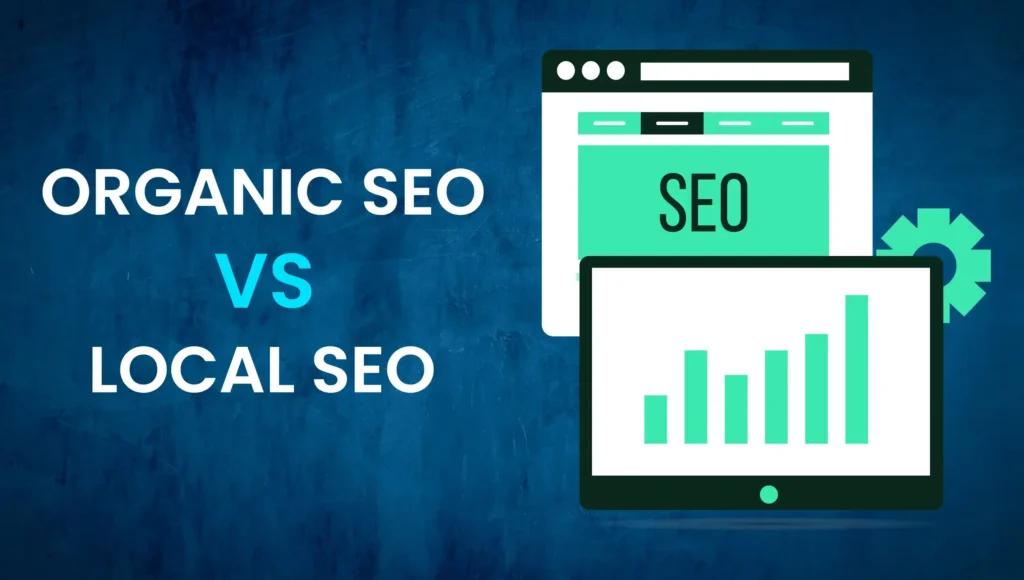Organic SEO vs Local SEO
Search engine optimization (SEO) is the most powerful strategies in digital marketing that helps businesses rank higher in search engine results pages (SERPs). As part of the professional field of SEO, there are two important categories, which are organic SEO and local SEO. Even though they have the same general idea in mind—boosting site visibility when users search for something in a search engine, they also differ in focus, strategies, and scopes. It is crucial for businesses, when trying to enhance their online presence, to understand the distinction and practical uses of each.
This blog gives an elaborate explanation about organic SEO and local SEO, their merits, and in which scenario best to implement them.
What is Organic SEO?
Organic SEO is the process of optimizing a website to rank as high as possible in unpaid (or organic) search engine results for relevant keywords. This focuses on global or site-wide visibility, where the shoe is on the other foot as it improves the quality and relevance of a website for search engine algorithms. This is a long-term organic SEO strategy that is focused on traffic, engagement, and authority in your niche.
Key Features of Organic SEO
Keyword Targeting
While organic search engine optimization focuses on competitive keywords and can have a high search volume, it is also broad phrases and can stretch inclusivity of between one to a few days. This could range from “best laptops 2024” to “digital marketing tips.”
On-Page Optimization
This includes this optimization of meta titles, meta descriptions, headers, and even content to ensure it is relevant to the targeted keywords.
Content Marketing
Organic SEO is content-rich all about high-quality, informative content. Blogs, whitepapers, videos, and infographics developed as part of content marketing strategies to boost engagement, backlinks, and domain authority are common.
Technical SEO
Technical factors like website speed, mobile optimization, schema markup, and secured connections (SSL) play a huge role in the success of organic SEO as well.
Creating Backlinks
Organic SEO involves building quality backlinks from authority websites, which indicates trust and relevance to search engines.
Benefits of Organic SEO
Broad Reach: Targeting and attracting your visitors from practically anywhere, with no regard to their geographical log size.
Long-Lasting Results: With organic SEO, the fruits of your labor will still bring in traffic long after your dime.
Great ROI: An optimized website can generate continuous sales and leads at very low cost in the long run.
What is Local SEO?
Local SEO focuses on local businesses with physical locations or service areas, allowing them to appear in local search results when users look for specific towns, cities, or regions. For example, local SEO searches would be such as “coffee shops near me” or “best plumbers in Miami.” This technique places a significant emphasis on the relevance of local keywords and the optimization of Google My Business (GMB).
Key Features of Local SEO
Geographic Keyword Targeting
Local SEO is all about keywords related to a particular place. An example would be a New York salon that could target the term “hair salon in NYC.”
Supplement Covered Topics and Analysis
An optimized GMB profile is a must for local SEO. These are hours, accurate contact info, great photos, and customer reviews.
Localized Link Building
Instead of chasing URLs from across the country, they build citations from local listings and partnerships with other local businesses.
NAP Consistency
Having consistent Name, Address, Phone Number (NAP) of all platforms greatly helps achieve local search accuracy.
Local Review Management
Strong ratings and encouraging consumer reviews on sites like Google Reviews, Yelp, and TripAdvisor can affect local rankings.
Benefits of Local SEO
Location-based reach: Perfect for bringing in customers nearby looking for your type of business.
Increases Foot Traffic: Drives customers to physical locations
Mobile Visibility: Location-specific queries are found to play a key role for the mobile searcher, especially post the introduction of mobile-first indexing; therefore, local SEO needs to focus on their mobile visibility.
Organic SEO vs Local SEO
Target Audience:
Organic SEO targets a global or national audience.
Local SEO focuses on location-specific audiences.
Keywords:
Organic SEO uses broad or niche keywords.
Local SEO incorporates location-based keywords.
Search Intent:
Organic SEO aims at informational or transactional searches.
Local SEO targets local intent searches (e.g., “near me”).
Ranking Factors:
Organic SEO relies on backlinks, content quality, and domain authority.
Local SEO emphasizes Google Business Profile, reviews, and citations.
Google Features:
Organic SEO ranks in standard search results.
Local SEO relies on Google Maps and local packs.
Business Type:
Organic SEO suits global e-commerce, blogs, or SaaS businesses.
Local SEO is ideal for restaurants, stores, and local services.
Reviews & Ratings:
Organic SEO does not heavily depend on reviews.
Local SEO uses reviews as a key trust signal.
Competition:
Organic SEO competes on a global/national scale.
Local SEO competes within a specific geographical area.
When to Use Organic SEO
ECommerce Businesses
Organic SEO strategies that focus on getting high-value product and category pages to the top are extremely beneficial for online stores that cater to customers worldwide.
Content-Based Businesses
Blogs, media websites, and content creators looking for nationwide readership usually keep organic SEO as a priority so that traffic can be improved with generating valuable content plus expert search engine optimization skills.
SaaS Companies
If you are a software-as-a-service business wanting customers in a city near you or the other side of the world, then the same principle applies; competing for the keywords they focus on in their own niche market will give you value.
When to Use Local SEO
Brick-and-Mortar Businesses
For businesses with a physical location—restaurants, salons, and retail stores—local SEO is critical to driving foot traffic and in-person sales.
Service-Based Businesses
The same goes for local service providers such as electricians, plumbing, and HVAC repair businesses that should have local SEO optimization to show up in your geographically relevant searches.
Healthcare Providers
Healthcare professionals such as clinics and dentists benefit greatly from showing up in location-based searches.
Integrating Organic SEO and Local SEO
For the majority of businesses, the best approach is the ultimate combination of organic SEO and local SEO. For example:
A hybrid business model (e.g. a florist with an online delivery service and a store in Chicago) may well want to focus on Local SEO and get new customers to its storefront while using its resources to invest in Organic SEO for companies looking for long-distance orders.
A firm that works with clients locally but writes legal articles nationwide can take advantage of both to get local leads and national exposure.
Combining these tactics will ensure that you are optimizing your reach on varying platforms to numerous audiences.
Organic SEO vs Local SEO: Challenges to Overcome
Time Intensity: Organic SEO and Local SEO both take time to see effective results.
Frequent Algorithm Changes: Google’s algorithms are constantly being updated.
However, strategic tools like Google Analytics and keyword research platforms (such as SEMrush or Ahrefs) can help businesses navigate these challenges, and hiring experts is a must when necessary.
Tools for Success in SEO
Here are some important tools that you can use in both organic SEO as well as local SEO:
The following are the examples of machine learning tools that are commonly used: Google Analytics is used to track the website traffic and the behavior of users.
Google Search Console: Tracks performance metrics and finds technical SEO issues.
SEMrush or Ahrefs: Perfect for keyword research and backlink monitoring.
Moz Local: Manage your business directory information across local SEO.
BrightLocal: Track online reviews and find local citation opportunities.
The Role of Content in SEO
Content is king in organic SEO as well as in local SEO. The only difference is how you approach it:
Organic SEO consists of educating your customers with in-depth blogs, videos, and infographics addressing competitive keywords.
Local SEO is oriented towards locally focused content, like geo-targeted landing pages or localized blog posts (e.g., “Best Cafés in Austin, TX”).
Final Thoughts
In Organic SEO vs Local SEO: which is best? Organic SEO and local SEO go hand in hand to generate the business with the help of search engines! Organic SEO helps businesses with national and international audiences, while local SEO helps small-to-medium businesses with geographic-specific audiences. But knowing when and how to implement the right strategy can make all the difference for your visibility online.
To make the best decision for you, we suggest taking a look at your specific business and local area before deciding if you want one or both types of strategies. And with search engines constantly evolving, your efforts will continue to be successful by following best practices and moving with the times.
FAQs
What is the difference between local SEO and general SEO?
Local SEO optimizes a business for location-specific searches and local audiences, using tools like Google Business Profile and local citations. General SEO, or Organic SEO, focuses on improving website rankings for broader, non-location-specific searches.
What is the difference between SEO and organic search?
SEO is the process of optimizing a website to improve visibility in search engines. Organic search refers to unpaid search results that appear naturally based on relevance to a search query, which SEO aims to enhance.
What is the difference between traditional SEO and local SEO?
Traditional SEO focuses on general visibility in search results, often for global or national audiences. Local SEO targets specific geographic locations, emphasizing location-based keywords and tools like Google Maps.
What is the difference between local SEO and global SEO?
Local SEO targets customers in specific geographic regions, focusing on localized searches and tools like Google Business Profile. Global SEO optimizes websites to attract an international audience, prioritizing broader keywords and global relevance.
What is the difference between local SEO and organic SEO?
Local SEO is a subset of Organic SEO that focuses on location-based searches, utilizing tools like Google Maps and local packs. Organic SEO generally aims to improve rankings for broader, non-location-specific keywords through quality content, backlinks, and technical optimization.


